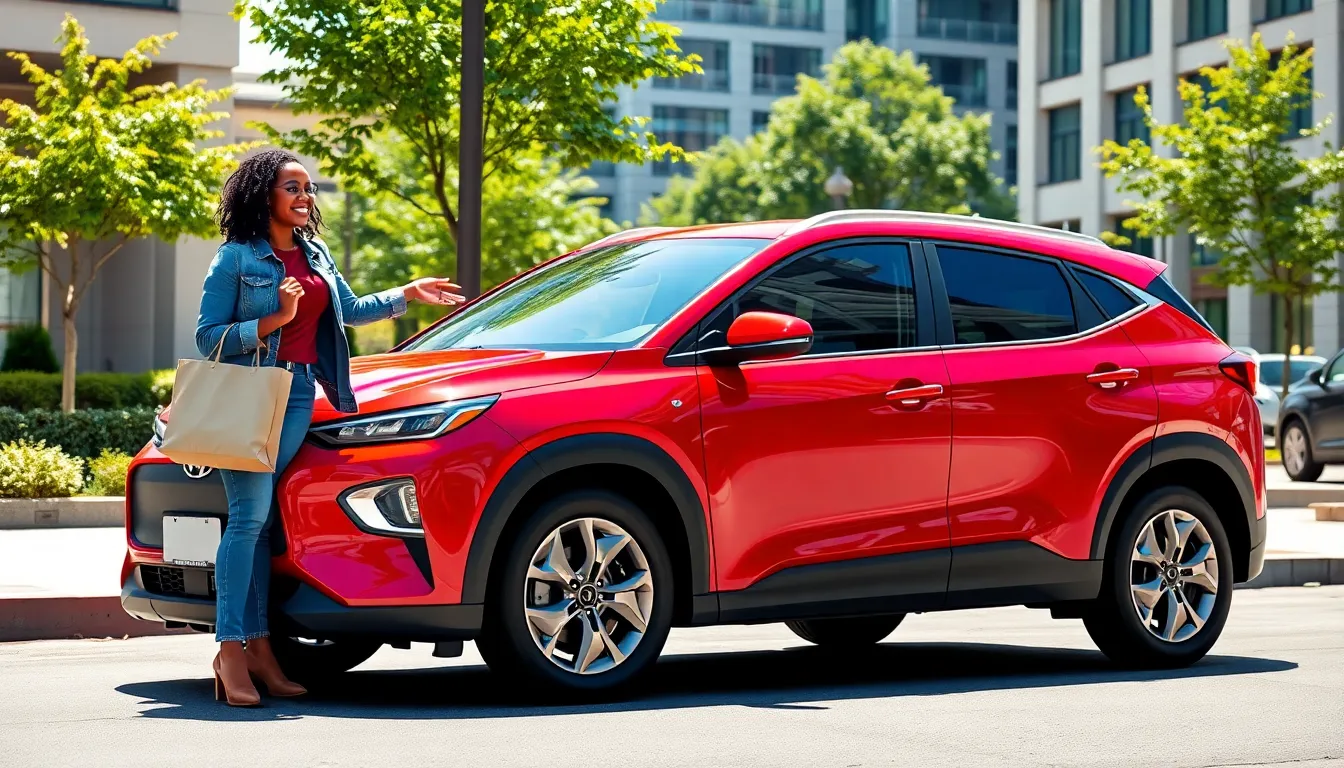Table of Contents
ToggleIn a world where gas prices seem to have a vendetta against wallets, hybrid cars are the superheroes we didn’t know we needed. They combine the power of traditional engines with the efficiency of electric motors, making them the perfect sidekick for eco-conscious drivers. Picture this: cruising down the highway, saving the planet, and still having enough cash left over for that extra latte. Sounds like a win-win, right?
Overview of Hybrid Cars
Hybrid cars represent a blend of traditional fuel engines and electric motors. This combination allows for greater fuel efficiency and reduced emissions. Many drivers prefer hybrids due to their potential for significant savings on fuel costs. These vehicles draw power from both a gasoline engine and an electric battery, making them versatile for various driving conditions.
Fuel efficiency rates often exceed those of conventional vehicles. The U.S. Department of Energy states that hybrids can achieve over 50 miles per gallon in city driving. Such efficiency helps consumers save money while benefitting the environment. In addition, hybrid cars typically produce fewer greenhouse gas emissions than standard gas-powered cars.
Technological advancements have improved hybrid performance over the years. Many models feature regenerative braking systems that convert kinetic energy back into electricity. This process helps recharge the hybrid battery while driving. As a result, drivers can enjoy enhanced efficiency without sacrificing power or performance.
Safety ratings for hybrid cars are often competitive with traditional vehicles. Various organizations, including the National Highway Traffic Safety Administration, provide thorough assessments. Many hybrids also come equipped with advanced safety features as standard. Consequently, drivers can feel secure knowing they are in a well-regarded vehicle.
The growing availability of hybrid options has made them more accessible. Car manufacturers now offer hybrids across multiple categories, including sedans, SUVs, and even trucks. This variety allows consumers to select a hybrid that meets their specific needs and preferences. As awareness of environmental issues increases, hybrid cars continue gaining popularity among eco-conscious individuals.
Types of Hybrid Cars

Hybrid cars come in several types, each designed to suit varying consumer needs and driving preferences. Understanding these types helps prospective buyers make informed choices.
Full Hybrids
Full hybrids operate using both a traditional internal combustion engine and an electric motor. These vehicles can run solely on electric power for short distances, improving fuel efficiency in urban settings. Consumers may enjoy seamless transitions between the two power sources without any driver intervention. Full hybrids typically achieve excellent mileage, such as over 50 MPG in city driving. Popular examples of full hybrids include models like the Toyota Prius and the Honda Insight.
Plug-in Hybrids
Plug-in hybrids feature larger battery packs than standard hybrids, allowing for extended electric-only driving ranges. Drivers can recharge these batteries from an electrical outlet, supporting greater reliance on electric power for daily commutes. Plug-in hybrids often provide benefits such as tax incentives and lower fuel expenses. A common range for all-electric driving can reach up to 25 miles or more depending on the model. Notable options in this category include the Chevrolet Volt and the Prius Prime.
Mild Hybrids
Mild hybrids use a smaller electric motor to assist the combustion engine but cannot operate solely on electric power. These vehicles typically enhance fuel efficiency through technologies like regenerative braking. Mild hybrids tend to be more affordable than full hybrids and plug-in hybrids. Features such as automatic engine shutdown during stops are standard, providing added benefits in terms of fuel savings. Models like the Honda Civic and Ford F-150 exemplify mild hybrids in the market.
Benefits of Hybrid Cars
Hybrid cars offer numerous advantages, particularly in fuel savings and eco-friendliness. Their design balances traditional engines and electric motors, providing unique benefits for drivers.
Fuel Efficiency
Hybrid cars excel in fuel efficiency, with many models achieving over 50 miles per gallon. This remarkable performance is a direct result of their dual power system, which utilizes electric motors to minimize reliance on gasoline. Regenerative braking contributes to this efficiency by converting some energy back into electricity during braking. Consumers experience significant savings at the pump, especially as gas prices fluctuate. Popular models like the Toyota Prius enhance fuel savings while delivering a smooth driving experience. The combined powertrain allows for optimal energy management, making hybrids an appealing choice for budget-conscious drivers.
Environmental Impact
Environmental benefits of hybrid cars are substantial. Lower emissions are a primary advantage, as hybrids reduce the amount of harmful pollutants released into the atmosphere. These vehicles typically produce fewer greenhouse gases due to their reliance on electric power, particularly during city driving. Cities benefit from reduced air pollution, leading to improved public health and enhanced urban environments. Many drivers enjoy eligible tax incentives for purchasing hybrid vehicles, further driving eco-friendly choices. Overall, the adoption of hybrid cars contributes positively to sustainability efforts, encouraging a shift toward greener transportation solutions.
Challenges of Hybrid Cars
Despite benefits, hybrid cars face several challenges affecting their popular adoption among consumers.
Cost of Ownership
Initial purchase prices for hybrid cars often exceed traditional vehicles. Buyers might pay thousands more upfront, depending on the model. Fuel savings can offset this cost over time, but not all drivers enjoy immediate returns. Additionally, resale values for hybrids can fluctuate, impacting long-term investment. Various factors, such as battery replacement costs, can drive expenses higher. Battery replacement may approach $3,000 for some models. Thus, thorough research and planning are essential for potential hybrid buyers.
Maintenance and Repair
Maintenance for hybrid cars introduces complexity compared to conventional options. Parts unique to hybrids, like electric motors, may increase repair costs. Technicians with experience in hybrid technology are crucial for optimal service, which can limit repair shop choices. Routine maintenance often includes battery checks, brake inspections, and system diagnostics. Such complexities may lead to higher dealership service costs. Warranty coverage typically mitigates some concerns, yet knowing potential future expenses remains vital for owners.
Future of Hybrid Cars
Technological advancements are driving the future of hybrid cars, enhancing efficiency and sustainability. Manufacturers continuously innovate, focusing on battery technology improvements that increase performance and reduce costs. As a result, hybrid models are expected to feature lighter batteries with longer lifespans, making them more appealing to consumers.
Environmental regulations are becoming stricter globally, pushing automakers to develop cleaner, more efficient vehicles. The push for vehicles that produce lower emissions aligns well with the growing popularity of hybrid technology. Newer models are anticipated to achieve even higher miles per gallon, potentially exceeding 60 MPG in specific urban settings.
Market demand for hybrid vehicles is on the rise. Consumers are becoming more conscious of their environmental impact, and many are actively seeking eco-friendly transportation options. This trend is likely to encourage manufacturers to expand their hybrid offerings across various categories, including SUVs and trucks.
Incentives for purchasing hybrid cars may grow more attractive as governments seek to boost electric vehicle sales. Tax credits and rebates could become more common, making hybrids more affordable and desirable. Availability of charging stations will likely increase, improving the overall convenience for hybrid owners.
Consumer education regarding hybrid vehicles is essential for increasing adoption rates. Increased awareness about the benefits, including fuel savings and reduced emissions, will help potential buyers make informed decisions. As more individuals embrace the hybrid lifestyle, the automotive landscape will gradually shift towards greener technologies, paving the way for a sustainable future.
Hybrid cars represent a significant advancement in the automotive industry. They offer a practical solution for those seeking to balance fuel efficiency with environmental responsibility. As technology continues to evolve and manufacturers innovate, the future of hybrid vehicles looks promising.
With increasing availability and a growing range of models, consumers can find hybrids that suit their lifestyles and budgets. The combination of cost savings and eco-friendliness positions hybrids as a smart choice for many drivers. As awareness of their benefits spreads, hybrid cars are likely to play a crucial role in shaping sustainable transportation for years to come.




